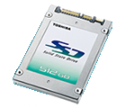Adata spins 512GB SSD
Mar 4, 2009 — by LinuxDevices Staff — from the LinuxDevices Archive — views Adata has announced a 2.5-inch SSD (solid state drive) with 512GB of storage and an SATA II interface, targeting “notebook and PC enthusiasts.” The “512GB XPG” (left) offers read speeds up to 230MB/sec. and writes up to 160MB/sec., the company says.
Adata has announced a 2.5-inch SSD (solid state drive) with 512GB of storage and an SATA II interface, targeting “notebook and PC enthusiasts.” The “512GB XPG” (left) offers read speeds up to 230MB/sec. and writes up to 160MB/sec., the company says.
(Click here for a slightly larger view of Adata's 512GB SSD, the XPG)
 Toshiba's THNS512GG8BB (Click image for further information) |
While Adata touts its new XPG as “the highest capacity SSD in the industry,” Toshiba announced a similar product, the THNS512GG8BB shown at right, last December, claiming the device would be sampling during the first quarter of this year. The appearance of a competitor, however, is a sign that the replacement of rotating drives in mainstream mobile computers could finally be at hand.
Adata doesn't say what type of flash memory the XPG uses, but we suspect it's MLC (multi-level cell) NAND flash, as on Toshiba's product. This type of memory, while less expensive than SLC (single-level cell) flash, is more prone to wear, which may be why Adata is targeting “notebook and PC enthusiasts” with its new device rather than enterprise users.
According to the company, the 2.5-inch XPG comes with a standard SATA II interface. Data reads are said to be up to 230MB/sec., and writes up to 160MB/sec. (These figures lag just slightly behind the Toshiba drive, which was claimed to have read speeds up to 240MB/sec., and write speeds up to 200MB/sec.)
Shock resistance — always an advantage of flash storage — is said to be up to 1500G over a period of five milliseconds. Meanwhile, the device is said to have a MTBF (mean time before failure) of 1,500,000 hours (about 170 years).
Despite these reassuring numbers, reliability is still a concern with MLC flash, which is prone to usage wear from reading, as well as from writing (for instance, if errors are detected during a read, a wear-inducing write operation results). Perhaps because of this, Adata does not attempt to quantify longevity in the typical “load/unload cycles” metric typically used by hard drive vendors (who are claiming about 600,000 such cycles for modern products).
Further information
Adata did not provide pricing or availability information for its new 512GB XPG. More information on the company's earlier SSDs may be found on the company's website, here.
This article was originally published on LinuxDevices.com and has been donated to the open source community by QuinStreet Inc. Please visit LinuxToday.com for up-to-date news and articles about Linux and open source.